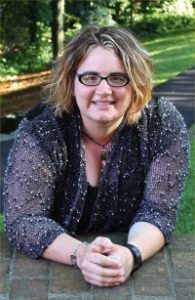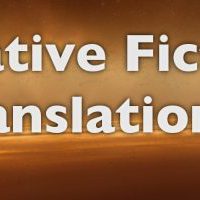Kameron Hurley: Horror & Glory

Kameron Hurley was born January 12, 1980 in Battleground WA. She attended college at the University of Alaska in Fairbanks, then attended graduate school in Durban, South Africa, where she studied the history of resistance movements against Apartheid. After returning to the states, she lived in Chicago for four years before settling in Dayton OH. She did ‘‘all of the usual things that folks do as they’re struggling to get a real job,’’ including working at a movie theater, cleaning dog kennels, and working various admin positions. She began writing copy for a financial services company, moved into marketing copy, and is now senior copywriter at a software company. She attended the Clarion writer’s workshop in 2000.
First story ‘‘Brutal Women’’ appeared in 1998, and she has published a handful of stories since, including British Science Fiction Association finalist ‘‘Afterbirth’’ (2012). Gritty debut SF novel God’s War appeared in 2011, and was nominated for Clarke, Tiptree, BSFA, and Nebula Awards, and won a Golden Tentacle for best debut novel in the Kitschies as well as a Sydney J. Bounds Award for Best Newcomer. God’s War began the Bel Dame Apocrypha series, which continued in Infidel (2011) and Rapture (2012). Her new Worldbreaker Saga, a weird epic fantasy, began with The Mirror Empire (2014) and will continue in Empire Ascendant (2015).
Hurley is also well known for her essays, which appear in numerous venues, including Locus. ‘‘We Have Always Fought: Challenging the Women, Cattle and Slaves Narrative’’ (2013) recently won a Hugo Award for Best Related Work, and Hurley won the Best Fan Writer Hugo Award this year on the strength of her essays.
Excerpts from the interview:
‘‘All writing is practice. There’s this funny thing that ends up happening once you get published: a lot of editors and publishers will tell their authors, ‘You should blog, it’s great for your career and it’s good visibility.’ What people don’t realize is these are very different types of writing. Novel writing, blog writing, corporate copy writing. Writing a website is very different from writing a marketing e-mail. They’re specific types of writing done for specific purposes and they have their unique formulas. A lot of people think, ‘I’m a writer, I can write everything!’ Well, no, you gotta sit down and do the work. I wrote 800 marketing e-mails before I thought, ‘I’ve got this down!’ I’ve been writing novels since I was very young, for 20 years. I’m finally like, ‘Okay, I think I’ve got this down.’ ”
…
 ‘‘Bantam originally bought God’s War in early 2008, and then there was the whole publishing meltdown. A lot of contracts got canceled and God’s War was one of those. It’s cool, we got paid, I’m not going to knock it. We went out to sell it again and got an offer from Night Shade Books. There were some rumblings about problems at the time – they were selling e-books when they didn’t have the rights to sell e-books, stuff like that. I remember when I posted publicly that I had made the sale, I had a writer friend e-mail me and say, ‘You know they’re not paying people?’ I was like, ‘What?’ This is why I’m a big champion of people speaking to each other in the genre. Because that problem snuck up on me. The situation got worse and worse. By the time I finished my draft of the third book, I said, ‘You need to pay me what you owe me or I’m not delivering this book.’”
‘‘Bantam originally bought God’s War in early 2008, and then there was the whole publishing meltdown. A lot of contracts got canceled and God’s War was one of those. It’s cool, we got paid, I’m not going to knock it. We went out to sell it again and got an offer from Night Shade Books. There were some rumblings about problems at the time – they were selling e-books when they didn’t have the rights to sell e-books, stuff like that. I remember when I posted publicly that I had made the sale, I had a writer friend e-mail me and say, ‘You know they’re not paying people?’ I was like, ‘What?’ This is why I’m a big champion of people speaking to each other in the genre. Because that problem snuck up on me. The situation got worse and worse. By the time I finished my draft of the third book, I said, ‘You need to pay me what you owe me or I’m not delivering this book.’”
…
‘‘My background is the history of resistance movements, particularly women in resistance movements. That really fascinates me – how do we build different cultures that remember to put women in these positions? In the Bel Dame books, there is a lot of toxic masculinity that you recognize as toxic because women are doing those things. When you put that ‘80s action-hero mantle onto a woman, you can see the damage it does more easily. A lot of science fiction takes you out of your normal experience, and says, ‘Look. Look at how this is different.’ Maybe not the best, maybe not the worst, depending on what it is they’re reflecting back.”
…
‘‘People were really upset about how I could call it science fiction without explaining things, like, ‘How does the mass work with those shapeshifters?’ I’m not going to write a glossary. It’s an adventure story. Someone else do the science, I’m busy. I’m writing a story. Genre wars are cool, people like them – it gives people on the Internet something to do. I want to tell a story. I want to be weird and crazy and far out. If I go into a story limiting myself in any way, saying, ‘I can’t have shapeshifters because where does the mass go?’ I’m not going to write as good a story. Mine is much more of a New Weird, anything is possible, who knows what it could be? sort of approach. We forget you can have a secondary world fantasy with aliens and spaceships. The problem is, people don’t understand the difference between a secondary world fantasy with magic and spaceships, and science fiction. Because they always want an explanation. ‘Oh, what happened in our world to bring about this future?’ It’s interesting to watch people do those contortions.”
…
‘‘There’s the architects vs. gardeners approach to writing novels. I’m certainly a gardener. Throw some seeds everywhere. Who knows what will grow? The architects, that would freak them out. They could not write that way. I’m the same if I’m constrained by an outline that says, and then this, and then this, and then this. I have finally gotten to the point where I can write more quickly when I sit down and think, ‘Here are the three things that need to happen in this scene.’ Even that seems like a constraint. But I have deadlines. I’ve got a day job. I need to find ways to hack my process and work faster. I work from home two days a week, which helps. That way I can make my own schedule, which is especially nice with book promotion, podcast interviews, and so on. I write from about 7:30-9:30 in the evening. Try to do that every night. Unfortunately what ends up happening is I have a 1,500 words a day goal. If I don’t hit that I need to sit down and write 4,500 words on Saturday. That sounds very difficult, but my great dream is just to sit down for six or eight hours and write. Having an hour and a half or two at night instead of having a big block of time is hard. You really just have to find ways to hack your own process, even if you’d rather be doing it in a different way.”






